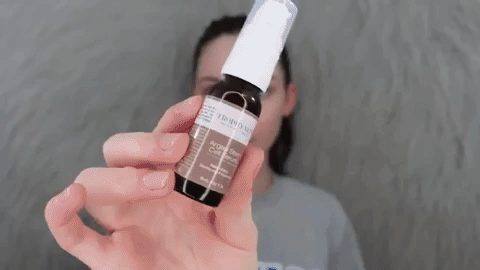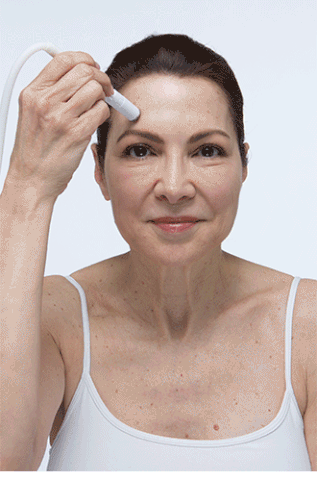Turning 50 is a major milestone for your skin. While your 30s and 40s may have been about protecting collagen and keeping the pores clean and blemish-free, your 50s is when your skin-care routine needs to be more reactive to the body’s natural processes. “The cell-renewal process slows down as we enter our 50s, leaving older, duller cells that stay on the skin’s surface longer,” says Dr. Dendy Engelman, a board-certified cosmetic dermatologist and Humphreys Witch Hazel committee member. Your 50s also bring lots of hormonal changes, which also affects the skin. This could be when you start experiencing fine lines, wrinkles, and sagging, as the body is producing less collagen and skin’s elasticity declines. Dehydration is also a big concern at this point, because your skin barrier becomes drier as you age. “Dehydrated skin will highlight signs of aging, making wrinkles appear more prominent and spotlighting uneven texture and dullness,” says Engelman.
A solid skin-care routine can help with all of these things. If you’ve already mastered the basics (cleanse, moisturize, protect), now’s the time to incorporate some active ingredients into your routine that will help speed up cell turnover and increase collagen production. It’s also time to focus on moisture — and incorporate it where you can into your skin-care routine.
We spoke to top dermatologists and a celebrity esthetician whose clientele includes Angela Bassett and Sheryl Lee Ralph (both of whom have very beautiful skin) for their ideal skin-care routine for someone over the age of 50, which we’ve outlined below.
Taking care of your skin during your 50s may call for some significant changes to your routine. Our Colorado dermatology specialists have provided some helpful pieces of advice to help you stay healthy throughout this decade.
Examine Your Skin for Cancer: The risk of cancer increases as you get older. Begin incorporating monthly self-exams to your routine. Maintain a strong relationship with your physician and report any changes you may find.
Use Night Cream: Dry and oily skin may start affecting you now more than ever. Night cream is a heavy skin care product that hydrates and nourishes skin overnight, leaving you feeling refreshed in the morning.
Avoid Highly Fragranced Products: Products with strong fragrances may now start drying out your skin, which causes rashes. Switching to fragrance-free products will allow you to keep treating your skin while minimizing the risk of irritation.
The changes you are encountering in your 50s can turn your normal skin care routine upside-down. Fortunately, your physician and dermatology specialists are here to help. They can work with you to make manageable changes and ensure you stay on the path to healthy skin.
There are so many factors, both internal and external, that affect our skin as we age. With the right lifestyle choices and skincare tricks, you can keep your skin looking healthy for years to come.
Check out these tips to learn how to have great skin in your 50s and beyond.
1. Stay Hydrated in your 50s
Water is vital for our overall health to make sure all of our organs function properly. The skin is the largest organ of the human body and if you’re not getting enough water, you’ll be able to see it in your skin.
Your skin might feel tight and uncomfortable and look flaky and dry. Drink at least half your body weight in ounces of water for healthier looking skin. It’s great for your whole body and might even stave off junk food cravings.

2. Eat a Healthy Diet in your 50s
You can actually eat your way to a good skin. Just like certain foods are great for keeping your bones strong or building muscle, there are dietary choices you can make to improve the elasticity and glow of your skin.
Colorful foods like berries, dark leafy greens, and whole grains provide tons of antioxidants, vitamins, and minerals to promote healthy and glowing skin. Foods rich in fatty acids, like nuts and seeds, can also improve skin tone and texture.

3. Stay out of the Sun in your 50s
The American Academy of Dermatology recommends sun protection as the basis for any skincare routine. The sun is the number one cause of premature aging, so it’s important to take precautions to avoid sun damage and skin cancer. Keep out of the sun as much as you can and always wear sunscreen.
If you are going to be outside for a long period of time and can’t avoid the sun, try out sun protective clothing, which blocks the harmful UV rays from the sun. You should also avoid all tanning beds. If you still want that look of bronzed skin in the summertime without the sun damage, try switching to a self-tanner instead.
4. Quit Smoking
In addition to all the very serious reasons to quit smoking, like heart disease and lung cancer, smoking can also cause you to age more quickly. The movement around the mouth while smoking can cause fine lines and wrinkles to develop in that area over time.
Smoking also causes vasoconstriction, meaning blood vessels to constrict and cut off circulation. Smoking can also have other negative effects on your appearance, such as stained teeth, so it’s best to avoid smoking at all costs.
5. Moisturize
As we age, one of the first things to go is our skin’s natural moisture. We tend to get dry and dull skin that is prone to get flaky and wrinkly. That’s why a daily moisturizing routine becomes crucial as we get older.
Moisturizing in the morning and at night with a potent product like the Argan Stem Cell Serum can increase firmness and elasticity in the skin. It also helps to use products with hyaluronic acid to plump up the skin.
6. Good Skincare Routine
It’s a cliche, but it’s true — when you look good, you feel good. Skin is often the first thing you notice about someone. Having a healthy, beautiful skin that comes from using the proper products and methods for your skin type give you so much more confidence.
Skincare is also an important part of a self-care ritual and can lead to adopting other lifelong healthy habits.
7. Know Your Skin Type
You might be doing all the right things and using all the right products — but for the completely wrong skin type. If a product isn’t right for you, it might actually irritate your skin and exacerbate the already existing issues.
The correct skin care routine gives your skin just what it needs and cuts out what it doesn’t. Trophy Skin developed a quick skin assessment to help you figure out your skin type. It will also provide tips on how to best take care of your skin.
8. Beauty Sleep
Beauty sleep really is a thing. Bad sleeping habits can increase stress and cause hormonal issues, which often appear on the skin such as eczema or psoriasis. Sleep is when the body repairs itself.
If you’re not sleeping enough, your skin simply doesn’t have enough time to repair itself. This accelerates the aging process when the skin isn’t fully repairing itself night after night.
Applying the right products before bed and getting a good night’s sleep will give you great skin in the morning and for other mornings to come.
9. Don’t Tug on Your Skin
If you use firm tugging or pulling movements on the skin, you are literally pulling and stretching the skin down, causing it to sag. You should also avoid harsh loofahs, rough facial scrubs, and scratchy washcloths on the face because they can actually damage the skin, rather than gently exfoliate. When you wash your face, don’t press too hard. Use gentle products with a light hand.
10. Don’t Forget Your Neck & Hands
These areas are often forgotten in the skincare routine, but they are actually some of the areas that give away your age the most! The hands and neck have thin, delicate skin that shows lines and wrinkles when our skin starts to age.
You don’t need any fancy hand or neck cream. You can use any lotion or moisturizer on your hands and neck twice a day. You should also moisturize your entire body a few times a week to keep your skin hydrated as well.
And don’t forget to put sunscreen especially on the back of your hands! It helps minimize age spots.
11. Limit Alcohol in your 50s
You can usually see on someone’s face when they’ve had a wild night of drinking the night before. Drinking can severely dehydrate you, causing your skin to look less plump, have larger pores, and a sallow complexion.
Try to limit your alcohol consumption when you can. If you do drink, you can follow up the next day with drinking lots of water and eating hydrating foods like watermelon and cucumber. You might want to stick to red wine too.
12. Keep Stress in Check
Life can be stressful; it’s a fact. Stress can have a negative impact on our health in many ways, including wreak havoc on our appearance. Stress often causes existing conditions, like eczema, to flare up, and can even bring about other skin issues.
The best way to take care of this is to develop coping mechanisms to deal with the inevitable stress of life. Go for walks in nature, meditate, or talk to a doctor or counselor if stress feels unmanageable. You may also want to get into aromatherapy or enjoy a long warm bath to melt your stress away.
13. Stay Active in your 50s
Typically, when we think of the benefits of exercise, we think about stronger muscles, higher endurance, and weight loss. Everything in your body can benefit from exercise, even your skin.
Exercise causes increased circulation and give your face a beautiful, healthy flush. Exercise can also make you sleep better and reduce your stress — both vitally important for the skin. Just remember to apply sunscreen if you’re going to be outside.

14. Get Facials & Treatments
The massaging action of a facial, along with the moisturizing products, helps to boost circulation and stimulate collagen in the skin. There are lots of anti-aging facial treatments out there, and you can speak to an esthetician about different treatments for your specific skincare concerns.
If you can’t make it to the spa, there are so many great at-home treatments, like the RejuvaliteMD anti-aging treatment, which reduces the appearance of sun damage and improves skin texture, all at home.
15. Exfoliate
Whether you have dry or oily skin, exfoliation is important for removing dead skin cells and revealing the glowing complexion beneath. As we age, the outermost layer of dead skin thickens, so we need to slough it off.
You can use a gentle sugar scrub on the face and an exfoliating mitt or washcloth on the body about once a week, or more if you feel you need it. For a more precise exfoliation, try microdermabrasion at home. With a simple touch of a button, you can buff away dead skin cells in no time.
Skin Care in your 40s and 50s
Wrinkle creams, eye serums, and other anti-aging skin care products can help diminish signs of aging. To create a truly effective anti-aging skin care plan, however, it helps to start with healthy skin care habits. The benefits of healthy skin care habits include:
- Prevent (or clear up) a blotchy complexion
- Retain skin’s youthful firmness longer
- Reduce fine lines and wrinkles
- Keep complexion looking brighter and younger
- Avoid leathery skin
- Reduce skin cancer risk
To help you create your own anti-aging skin care plan, you’ll find key healthy skin care habits below. Years of research supports each of these recommendations.
Anti-aging skin care tips
- Protect your skin from the sun. Sun protection forms the foundation of every anti-aging skin-care plan. The sun’s rays make our skin age more quickly. We have so much evidence that the sun prematurely ages our skin that there is actually a word to describe this effect. This word is “photoaging.” To help patients protect their skin from the sun and other harmful UV rays, dermatologists offer these tips:
-
- Seek shade. Be sure to seek shade between 10 a.m. and 2 p.m. and whenever your shadow looks shorter than you are.
- Seek shade. Be sure to seek shade between 10 a.m. and 2 p.m. and whenever your shadow looks shorter than you are.
-
Cover up in style. Whenever possible, wear a wide-brimmed hat, pants, and long sleeves. Gloves help to minimize common signs of aging on our hands such as age spots. Sunglasses help reduce fine lines around our eyes.
Slather on the sunscreen every day before going outdoors. To protect your skin, apply sunscreen to all skin that clothing will not cover. You want to use a sunscreen that offers broad-spectrum protection, SPF 30 (or higher), and water resistance.
-
- Forget about indoor tanning. The sun, tanning beds, and sun lamps expose you to harmful ultraviolet (UV) rays. These rays accelerate skin aging.
- Apply moisturizer every day. As we age, skin becomes drier. Fine lines and wrinkles appear. Moisturizer traps water in our skin, giving it a more youthful appearance. For best results, use a facial moisturizer, body moisturizer, and lip balm.
- Wash away dirt and grime twice a day. How you wash your face can affect your appearance. For best results, you want to wash with warm water and a mild cleanser rather than soap. You also should avoid scrubbing your skin clean.
- Stop smoking. Tobacco smoke contains toxins that can lead to smoker’s face. Signs of smoker’s face include dull and dry complexion, loss of skin’s firmness, premature lines and wrinkles, and leathery skin.
- Eat healthy foods. A healthy diet promotes healthy skin. Make sure you eat plenty of fruits and vegetables, lean proteins, and healthy fats.
- Get enough sleep. It’s called beauty rest for a reason. Sleep gives your body time to refresh and renew itself.





